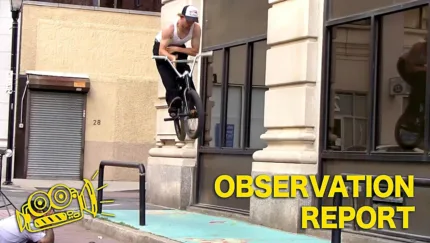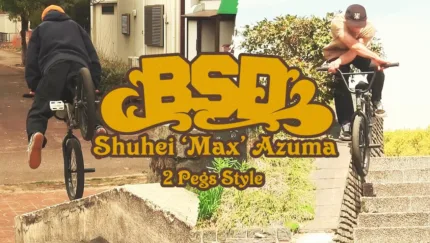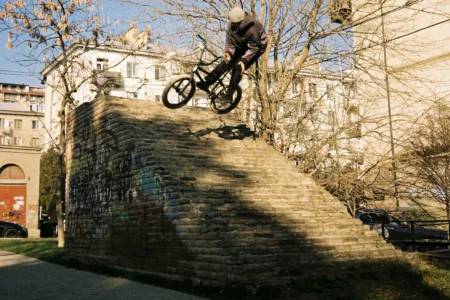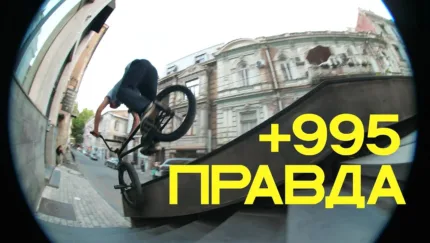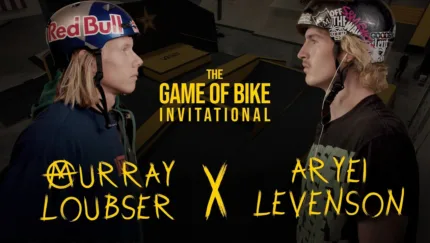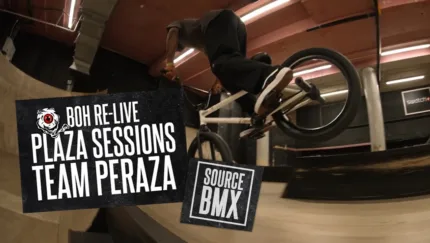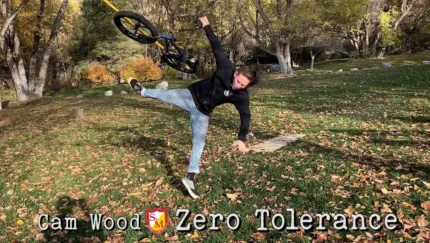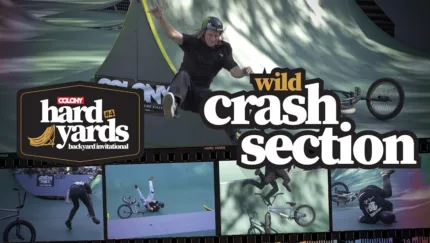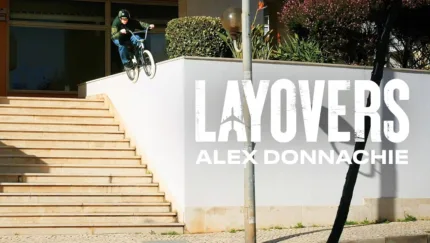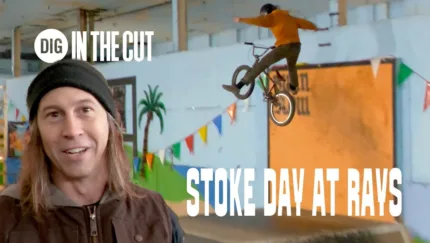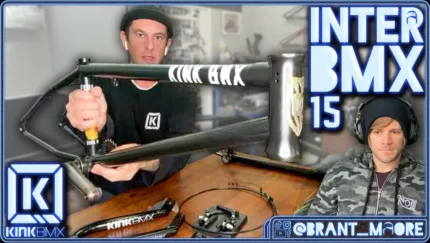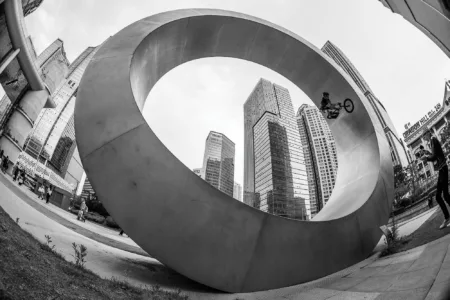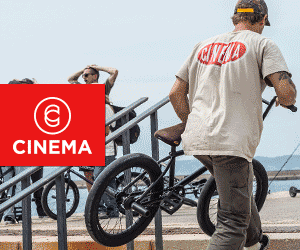
A Simple Question: Does This Contest Format Work?
In 2016 can you successfully mix the world's best Street and Park riders on one course and judge them fairly?
Intro by Will Smyth Photos by Vince Perraud (unless otherwise noted)
Before we get into this let's get one thing straight; The guys behind Simple session, Risto Kalmre and his brother Mario, deserve nothing but credit for not only running a great contest weekend for 16 years straight, but for having their fingers on the pulse every year and trying to bring the World's best street and park riders to their event. Their dedication and desire to keep the event going strong for so long, and to keep BMX In the right kind of spotlight, is truly remarkable and long may it continue.
As much as we love the contest (and others like it) it's been increasingly obvious in recent years that the format of combining park and street riders on one course was becoming not only increasingly difficult to judge, but less relevant in terms of how most people approach BMX nowadays, with the majority choosing to focus more on a single aspect of riding. Obviously there are plenty of people out there who still ride a bit of everything (and some like Dennis Enarson, Drew Bezanson etc really excel at that) but for the most part it's the riders focused on a single aspect of riding that have really pushed and progressed BMX to those new levels on a regular basis. Wether some like it or not, the all-round 'freestyler' is long since a dying breed.
With only a small number of street riders reaching the final of Simple Session 16 (to the surprise of many onlookers - ourselves included) we figured that it was fair to ask the question "Does this contest format actually work?" We'd heard a lot of feedback (some positive, some negative) over the past two or three years so we decided to put the question out directly to a mix of riders (Pro and industry types) who've all had experience of Simple Session in varying forms over the years to find out what they had to say on the subject. We tried to get as good a mix of responses as possible but one thing to note is that we didn't get as many replies from Park riders as we would have liked. We'll add those in and update the article as they come to us. Also, not everyone was comfortable giving their honest opinion on the subject for various reasons.
For what it's worth I've personally had a bit of experience in judging bigger events as well as coming up with event concepts and picking judges to suit certain event formats, so I do realise how difficult the whole process can be. As great as Park riding can be, it is obviously an easier sell to an un-educated audience... but we shouldn't be afraid to show a new audience just how hyped we are on street riding and how progressive it really is too. If anything pitting the two styles against each other de-values street riding and the incredible level that it's at. Consider too that for the longest time it's been street riding that's been the biggest driving force for most riders*, most legit BMX brands, and most of the BMX media in helping BMX to move forwards. (*according to almost every BMX media reader survey for well over a decade). And... comparing Park riders who focus on tricks with those Park riders who just blast with flow and style adds another layer to this whole thing too.
Having a better contest system that shows more respect to the increasingly progressive and technical nature of street riding, and that diversity within Park riding, is not going to make Simple Session any less of an amazing weekend for everyone involved. Not least if there's more open communication between judges and riders as to what exactly is being judged, and how. If anything it will make any event better, encourage more people to watch, and hopefully encourage the best riders to keep attend ing future events.
This is an open and ongoing discussion and all views are more than welcome (although first to say "just go ride your bike" wins nothing). If the subject interests you then read what these guys have to say and feel free to add your thoughts and comments in below. There's no right and wrong here... just opinions.


1. CHRIS DOYLE: A true all-round rider. Broadcast Expert Analyst for Red Bull TV at SS16.

"I've never judged a high profile BMX park/street event. Therefore, I don't know how hard it must be to judge a die hard street rider against a high flying, box-jumping, park rider... well, judge them fairly anyway.
Both BMX park and BMX street are progressing in two different directions and the line between the two is becoming more and more stark. New school riders could care less about being well rounded anymore - they pick the style of rider that they'd like to be and they try their best. I've seen hardcore street kids struggle to clear a basic box jump and I've seen park kids sweat the smallest of handrails. When a rider does a park run, it's up to them to use the ENTIRE course to the best of their ability. Leaving entire obstacles unused should hurt scores... most contest runs are judged on overall impression, right? I'm thinking about guys like Dennis Enarson, Gary Young, and Garrett Reynolds; none of those guys were at Simple Session but I couldn't help but think about them and how they
With all that said, if we want to keep the modern day riders happy, there should probably be a separation between the two competition styles. Or, maybe even just find a difference in judging style. What that is, I'm not sure." - Chris Doyle
"I've seen hardcore street kids struggle to clear a basic box jump and I've seen park kids sweat the smallest of handrails."- Chris Doyle

2. BRUNO HOFFMANN: Pro Street rider. Non-qualifier at SS16.
"I don't really think it's possible to judge riders in the same format anymore. Street and Park are two totally different things nowadays. I think that back when Simple Session started and Garrett was still going, he would always win but he was like the best mix of both of those worlds, and riding was still more one thing back then and not as divided as it is now. Pretty much since then, for the last five or six years, it's been getting so much more progressive on both sides of riding that it isn't really possible to mix them up in the same judging format anymore. Also the course… it was cool and that but it wasn't a full on version of either - it wasn't a real street course and it wasn't a real ramp/park course. I feel like both sides don't get as much as they can out of it.
The area obviously isn't big enough to make two separate courses, but trying to cater for both sides isn't really going to be possible. Then judging the two things together is a whole different story. I don't really think it's working that well anymore. The crowd seem to appreciate both as well because when Courage (Adams) was going crazy in finals and pulling everything, you could really feel that all the people watching, even ones who didn't know about BMX were into it and making noise. I wouldn't go so far as to say the crowds only want to see ramp riding but the majority of people probably lean towards a front-flip over the jump box than a bar crook 180 down a rail… Also, obviously they put the big boys on last during qualifying to make sure people stay until the end and watch the riders they want to see, but it probably means that they get higher scores from the judges later on. It's a tricky one." - Bruno Hoffmann
" I wouldn't go so far as to say the crowds only want to see ramp riding but the majority of people probably lean towards a front-flip over the jump box than a bar crook 180 down a rail… "- Bruno Hoffmann

3. MAT HOFFMAN: Undisputed boss of it all. Simple Session 16 Judge.
"I’ve heard a lot about Simple Session over the years and finally made it out for a first-person experience this year and then was asked to judge. As we all know, this is the part of Simple Session that is the most difficult to understand: How do you judge Street against Park?
I was up for the challenge and embraced the idea that it’s freestyle and it was nice to let it be as it is and defy explanation. Yes, it is impossible to judge Park against Street, but there was a time not long ago when this wasn’t divided into two disciplines, and it’s easy to judge how rad someone is getting with their choice of obstacle. It was nice to let it be less about a “formal competition” and more about a jam of incredible talent, contributing progression in their own way with a format imposed that doesn’t make modern “sense.”
I come from a different situation and see such formal contests all the time, so it was a breath of fresh air to see something that felt raw and casual. However, I can also understand from a rider's situation, especially being a Street rider at SS16, it would not be as refreshing and would be frustrating competing against a whole other form of riding.
Riding has evolved so much in 16 years, Risto and Mario may modify it into two separate jams in the future, but it felt good that it didn't have to, either.
Thanks for all the passion that brought us all together in Estonia. Thanks for keeping the dream alive. Peace, Love, BMX" - Mat Hoffman

Photo by Gert Nõgu
"I come from a different situation and see such formal contests all the time, so it was a breath of fresh air to see something that felt raw and casual."
- Mat Hoffman
4. PAUL ROBINSON: Liftetime BMXer. WTP / Eclat Team Manager. Regularly sends team riders to Simple Session.
"If you put on a contest that includes a mix of technical street riders and ramp/jumpbox riders then you have to make sure your judges are equally experienced in all of those disciplines. I am not going to bad mouth the judges at this year's Simple Session, I ain't going to put blame or talk shit but from what I could tell (with the exception of Kachinsky) it was all judges from a ramp/trails/vert background or in that direction. If that’s the case then the results are not surprising.
Judging is so important and it’s not even about the quality of a judge, that’s not my point. I wouldn’t employ Lee Musslewhite to judge a street jam as much as I wouldn’t employ Van Homan to judge a flatland contest, but if both disciplines were together in one contest then I would hire them both as I’m 100% sure they both can bring something to the table and at least one discipline isn’t going to get drowned out which, lets be honest, is kind of what happened at Simple Session this year. It’s not hard to balance the judges to reflect the different styles in BMX.
I was seriously surprised that so many street riders didn’t make the last 20. If you have 70 riders in one contest and even 30 of them are street riders then you absolutely need at least two of the judging team to be riders who are connected, or have some kind of knowledge of modern day street riding. Otherwise they don’t get it, they don’t understand what they are seeing and they just award whatever to whomever goes the highest and does the most amounts of twists and turns. I know there are many layers to judging and its not just about what tricks you can do but Simple Session 2016 has shown that something needs to change otherwise next year its going to be a ramp riders only contest as no brands will fly out street riders. So my conclusion is based on what I see, I can’t help that. If you want to have a good mixed competition then you have to balance the judges based on their individual knowledge of BMX, otherwise you get people like me spending their bank holidays writing and complaining about it.
Simple Session is still great, its just the results don’t reflect a fair representation of what’s going on in BMX overall." - Paul Robinson
"I know there are many layers to judging and its not just about what tricks you can do but Simple Session 2016 has shown that something needs to change otherwise next year its going to be a ramp riders only contest as no brands will fly out street riders."- Paul Robinson

5. JASON PHELAN: Pro Rider (Rides Park & Street). Previous Simple Session attendee but was not invited to Simple Session 16.
"BMX is growing at such a fast pace these days and its so hard to know what is right and what is wrong. There’s so many opinions, attitudes, styles and EGOs flying about this very small industry. We have contest riders, video riders and riders that are 'Sentenced to Life', due to the love of bikes and the lifestyle that comes alongside.
Here raises the question. Does the contest format work mixing park and street riders together on one course to battle out there totally different styles under the same group of judges old and young? In my eyes, going from the way recent contests have gone, NO it totally does not work and something needs to be done.
There is a few formats I think work pretty well that I have seen over the years; One where riders get judged separately on their park and street style and use of the course overall. This is a lot harder on the judges but at the end of the day it really does crown the overall best rider.
Just say the parks are not going to change and the two categories will stay mixed together, well then I would expect the rider to use everything park and street and get penalised if not.
Team events also work, are great fun and helps people to work together on their strengths and weaknesses. The divide that I feel is happening right now between park and street riders, gum shields and peg bashers, having these guys work together could be an interesting format.
SlopeStyle events also look to be killing it right now and this way you have no choice in the matter but to hit park and street on your way through a course.
At the end of the day to push BMX in the way its going it looks like there needs to be two separate contests / categories for park and street and also separate judges. Park and Street judges. And lets try and leave being biased at home, even if someone isn’t wearing your favourite branded underwear or is not part of a team you like. I don’t want my emotions to run wild here because I feel very strongly about BMX and the longevity with it so I’m going to leave it at that. See you guys on the podium." - Jason Phelan
"The divide that I feel is happening right now between park and street riders, gum shields and peg bashers. Having these guys work together could be an interesting format."- Jason Phelan

6. BROC RAIFORD: Pro Street Rider. Qualified and placed 16th overall at SS16.
"I've been attending Simple Session for the past three years in a row and have always had a great time. Sure the traveling and jet lag may be bothersome but that doesn't stop the event from putting a smile on my face. Not only do we get to session a newly designed course each year but also hangout with riders from around the world. No matter how you choose to ride, Simple Session always has something you're stoked to session and because of that it brings all styles and disciplines together under one roof. I get to spend time hanging out with riders I'd otherwise never get to know because of the split between our styles of riding and contest scenes. That's what makes Simple Session an event I hope I never miss out on. However, each year the judging is brought up as all the disciplines continue to progress in their own unique ways.
How are you supposed to judge a triple tailwhip compared to a bar pegs hard 360? You're not going to be able to in a way that makes sense to everyone. That's like comparing ballet to breakdancing. Instead, I think Simple Session is a challenge of riding everything. To get out of your comfort zone and ride the entire course to score your best. I've always gone into this event knowing I'm going to ride the box jumps, the rails, the quarter pipes, the ledges... etc. So when I'm asked if this style of contest format works, I say hell yeah it does! Sure some people want it to be just a 'park' contest or just a 'street' contest but why can't it be a 'BMX' contest? All of us, on our bikes, riding everything in front of us, no matter what kind of rider we'd like to consider ourselves as. It’s only then that no one will question the judging of this contest because everyone will be stoked that everyone is there to ride their got damn bikes.
It would be easy to take sides with one or the other and say we need two separate contests. But that wouldn't make this event as unique. My favorite thing about Simple Session is that you'll see a 'park' rider do a hanger or ice pick on a rail and then the next run you'll see a 'street' rider do a flair or an air table. I think if everyone went to Simple Session with the mindset that it's a contest of riding anything and everything, then judging the different styles would not be an issue. I may be wrong though, or you might not agree with how I look at it, but I know damn well I'll be attending many more Simple Sessions and will be just as stoked to be a part of an event that allows some of the most talented riders in the world of all styles to hangout and do the one thing that makes us all happy... Ride our bikes!" - Broc Raiford
"So when I'm asked if this style of contest format works, I say hell yeah it does! Sure some people want it to be just a 'park' contest or just a 'street' contest but why can't it be a "BMX" contest?"- Broc Raiford
7. BRIAN KACHINSKY: Pro Street Rider and rail slayer. Regular Simple Session contestant. SS16 judge.
"I’ve attended Simple Session for 8 years now and most of those have been as a rider. I’ve made finals at some and also done poorly at some. Due to an injury this year I was asked to be a judge. I knew that it was going to be a challenge but I love a challenge. My mindset going into judging the event was how I was going to potentially score big boxjump tricks to tech street lines and I had some personal guidelines set for myself as to how I would score them. I basically judged my scores on variety, originality, energy, style, tricks, use of course and several other aspects which in my mind makes a good overall impression for a contest setting. The scores need to be made quickly which makes it difficult. I’ve judged live events before and knew that I had to have to put forth some thought before the contest on how I was going to score street runs versus park runs, etc. It became apparent during the contest that this would be just as difficult as I thought so I’m glad I was prepared for it.
In the end when I looked over my notes for the runs I think I did a fair job. I know due to the subjectivity of judging that it’s not always going to be perfect but I think it’s important to put forth maximum effort judging since you know the riders are going to put maximum effort towards their runs. Being a rider in this event and many other events I know this all too well. Sometimes you get judged better than you should have and sometimes you might get judged lower than you should have but that’s the way it goes.
In the end was it fair? I would say probably not but there are ways we can make it better.
Would I do it all over again? Absolutely. I like to challenge myself on and off my bike and this was certainly a challenge. I of course relate closer to street riding but respect all aspects of BMX and have competed in and watched many park contests over the years. Street riding is more tech than ever and this won’t change it from becoming increasingly mind-blowing. Park riding is also on a level never seen before and there is also some creativity amongst some riders as well.
Is it a good event for BMX? Yes. Simple Session has been responsible for many good friendships from all over the globe and it also sheds light on new talent. There are very few BMX events that have 15+ countries represented. It’s nearly impossible to judge since everyone’s opinion is different on what they like to see. I think there are some ways to improve the judging aspect of it and rather than complaining, I would rather just have an in-depth discussion about it leading up to the next event. At the end of the day everyone who watched Simple Session will remember who killed it and who pushed the boundaries of what we all thought was possible. I’ll always remember how a rider inspired me over how they may have placed. It’s that respect that makes BMX the best thing on earth to me." - Brian Kachinsky
"I know due to the subjectivity of judging that it’s not always going to be perfect but I think it’s important to put forth maximum effort judging since you know the riders are going to put maximum effort towards their runs."- Brian Kachinsky

8. BEN LEWIS: Pro Street rider. Did not qualify at SS16.
"In 2016 can you successfully mix the worlds best Street and Park riders on one course and judge them fairly?"
Simply, no.
While there are many riders who can ride both ramps, heavy street and technical street obstacles well. To judge a tech ledge trick that may take 10 hours to film pulled first go on a foot tall ledge versus a double back flip whip seems impossible. The crowds understanding of tricks and the judges technical ability also comes into play. The crowd get hyped on a varial trick and want a big score. A lot of judges wouldn't know when a street rider is doing an opposite grind let alone a switch opposite or a switch regular just to make things more difficult and that's heartbreaking sometimes.
I think Simple Session is a brilliant contest, don't get me wrong. They have a lot to cater for and do the best they can. Having a best trick jam for the street riders is why I go. It gives the technical guys a chance to try their hardest tricks or invent new tricks with the time that's necessary to do this. However pushing that idea further for all the street riders as a jam for a longer period of time and having the park contest separate may yield better results. Prize money doesn't matter there. We go to have a good time and ride with friends but I think a lot of the time street riders come off a lot worse in terms of judging." - Ben Lewis
"A lot of judges wouldn't know when a street rider is doing an opposite grind let alone a switch opposite or a switch regular just to make things more difficult and that's heartbreaking sometimes."- Benny L

9. DARRYL NAU: 25 years riding. Announcer and rider for S&M. Event and party organizer. Five times Simple Session announcer.
"In my opinion the format of combining the two styles works great because it makes for a more interesting contest for the viewer. I would say the proof is in the fact that Simple Session is one of the most viewed BMX webcasts (to the best of my knowledge there is not even a close second). A lot or other events happen, are streamed and unfortunately people are not interested in them like this format.
I believe the more people that are talking about an event for better or worse based on scores, riders, course design or placings is the sign of a successful event. When an event happens and no-one cares that is one of the worst things that can happen because that means the event was not compelling, unique, authentic or most importantly a fun experience. If you are selling a ticket to a Contest or asking someone to watch an event online you are asking for their time. That should be respected with an entertaining and exciting event. Yes the riding is very important but online videos where the rider films for months or years will showcase riding details better than you can in one shot during a run.
Judging a contest is a very difficult job. Not only do you have to judge all runs against each other with your own opinion but also have an in-depth knowledge of what is going on in BMX up to that moment. Scores are heavily influenced by world's firsts, unique styles and if any other rider would even think of taking the same approach on the course. In an event that has no finish line the opinion part helps make BMX more exciting and fun as opposed to an event like gymnastics where everyone is executing the same moves perfectly and only be deducted for mistakes.
That being said if the judges are knowledgeable about all styles of BMX, I'm confident that it doesn't make a difference having the two combined in terms of place standings. For example, if you break a 'street run' and 'park run' down to a shortened one trick a run. Let's say someone did the most progressive jumping trick that no one has ever done and slipped a pedal that might be a hypothetical nine based on all that is happening in the current state of jumping and the same can be applied to street for crazy combo including grinds no ones has done and that might be a 10. They are judged more based on what is happening in the current moment of each style of riding and then you can look at those scores and judge them against themselves to see where they stand. The 10 street run would take it. Obviously speed, execution, difficulty and style all get factored into those two hypothetical scores.
Some contests lack in having an atmosphere for riders to enjoy themselves outside of the arena so the main objective of anyone traveling to the event would be to enter and 'do good' with a top placing. Obviously with all of the time and money spent that puts a lot of pressure on your 2 qualifying runs so most riders are going to stick to riding the course with as much consistency or tricks they know how to do as possible and that is why it sometimes contests tend to feel as if a lot of riders are doing the same thing with only changing the order. In my opinion, having both disciplines together helps break up the monotony of this potential situation.
Based on these points, the fact that we are having this discussion is just more proof that Simple Sessions format is a successful one. That aside, for anyone reading this around the world, if you have not been to Simple Session or a European contest please do yourself a favor and book a ticket for next year. They are open to everyone and really fun to go to especially if you're not riding. It’s not as expensive as you might think, it’s a great way to see Europe and make international friends that will last you a lifetime. In the words of Pat Casey’s brother in law who doesn't ride but went for his first time this year was heard yelling on the dance floor to me, 'This is fucking amazing, I am never missing Simple Session again!' "- Darryl Nau

"If you are selling a ticket to a Contest or asking someone to watch an event online you are asking for their time. That should be respected with an entertaining and exciting event. Yes the riding is very important but online videos where the rider films for months or years will showcase riding details better than you can in one shot during a run."- Darryl Nau

10. John Povah: Lifetime BMXer. Former: UK / US Pro, X-Games judge, Worlds Judge, Rebel Jam judge. Metro Jam judge Currently: Rider, etnies and flybikes Marketing manager / TM, event organizer, US Open Van Doren Invitational judge.
"As it stands, in my personal opinion, the traditional judging format, with BMX’s many disciplines is pretty flawed, it happens, but it’s not really a fair or legit system, it’s just kinda 'forced' to work and allows for much scrutiny by not only the riders, but also anyone viewing it. Lets just say for the hell of it, rider “A” does certain tricks, and then rider “B” does a whole other different set of tricks and then the two runs are somehow supposed to be subjectively judged as a side-by-side comparison, it just doesn’t make sense, but that’s how judging currently works! Mike Aitken’s 2008 winning Dew Tour dirt run would be a great example, he didn’t flip, whip or throw the bars, so how the hell did he win? (!?!?) There was a big behind-the-scenes stink, the judges got a talking-to and viewers who don’t ride (and some that do) were confused as to why he won, but those in-the-know 'knew' he won because what he did was clean, smooth and stylish, he didn’t do one trick that any of the other competitors did and it was unique to him, but somehow he’s supposed to be subjectively judged, it just doesn’t make sense and that’s why his run stood out as a target for criticism, it wasn’t a tailwhip judged against a tailwhip or a flip against a flip! Or, lets make matters worse by throwing two completely different disciplines in the same pot such as park and street and expect them to be judged on an even playing field … This “definitely” doesn’t make sense, but it happens! Unless, hypothetically, tricks had a value per trick and sliding scale for that trick depending how it was executed, and / or there were a certain amount of compulsory tricks to create a base score, then depending on how those tricks are executed, i.e: higher, farther, smoother etc, then anything they did above and beyond that is judged with a value on that specific trick also. Or, alternately, have dedicated judges per aspect of what a complete run would be considered, i.e: 'style' judge, 'course use' judge, 'tech judge', 'go big' judge etc, then add them up to create a total. There’s also 'overall impression' in some instances, but that seems a bit of a cop-out that allows for a lot of bias as no two judges are going to view things the same, but for a specific judgment call it allows for an outcome that under conventional judging circumstances would be viewed very-very differently. But I’m not sure we’d want any of this to be honest, that’s judging in a nutshell, a 'judgment call', one person's opinion against an others, its always going to be subjective, which is also what makes BMX cool.
In all honesty, I don’t think there’s necessarily a perfect formula for judging BMX… And I’m not sure, at least from my perspective that I’d want it if someone created it. We’re all going to see or appreciate things differently, and that’s what makes BMX awesome and personal to each of us, its only when competition is thrown in the mix that it opens itself up to criticism or scrutiny. The only solution would have it go the route of ice-skating or gymnastics, and there are definitely 'some' out there that are pushing for this. But, for me… Fuck it, that ain't my cup-o-tea, I’m gonna keep riding regardless, and to me, BMX is perfect with its imperfections." - John Povah

"BMX, with its varied riding styles and defined disciples (other than racing) is a bit weird to judge in the first place. There’s no start / finish line, goals to score or times to beat, its all just very subjective and personal to each of us, but as with most things, competition always works its way in somehow, no matter what, in some form or another as a way of validating or creating value in whatever activity it may be."
- John Povah

11. GRANT SMITH: Riding for 33 years. BSD company owner. Regularly sends riders to Simple Session.
"Simple Session is always a crazy weekend, the contest and partying in Tallinn are amazing and it's no wonder so many people flock there every year. However for the last few years there has always been bitching about the judging and to be honest it's no wonder why, given the current state of riding it would be a nightmare to judge that contest.
The riding at the contest is almost completely split into two styles now that really can't be compared against each other. I'm sure some people will say it's a 'freestyle' competition and the riders are free to choose what to ride at the contest but that's rarely what's happening. It's pretty much split into 'park' (ramps) and guys riding 'street' (ledges and rails). Classifications suck, but it is what it is.
The two styles are so different and it seems like their progression is headed in separate directions, you don't see many Garrett Reynolds style X-games runs any more. 'Park' riding is probably more visually appealing to the general public and 'street' is getting so crazily technical these days that if you don't pay close attention then you're likely to miss the intricacies of what's going on. Maybe splitting the contest into street and park events is too much of a headache for the organisers but when they're showing BMX on a world stage like this I think it needs to be shown in the right way." - Grant Smith
"I'm sure some people will say it's a 'freestyle' competition and the riders are free to choose what to ride at the contest but that's rarely what's happening. It's pretty much split into 'park' (ramps) and guys riding 'street' (ledges and rails). Classifications suck, but it is what it is."- Grant Smith

12. SEBASTIAN KEEP Lifetime BMXer and UK based big air master. Recently formed the transitioned focused BMX company Tall Order'.
"It's not fair because unlike when Simple Session first started years ago park and street have separated into two or more different types of riding. It's not possible to fairly judge Alex Kennedy riding one side of a course against say Logan Martin riding in the same contest on the other completely different side of the course with our judging system. We can't sit here and blame Risto though, he is trying to put on a good contest and please everyone. With the separation in styles more apparent than ever though he will need to separate the two contests. Problem is then does he drop one style? Judging is our bigger problem.
With BMX evolving constantly we are now seeing another separation in park. How do you judge Logan Martin against Chase Hawk? In our present judging system during a big contest our poor judges are given these conundrums constantly and the computers need the scores/answers NOW and AGAIN and AGAIN and AGAIN! Constantly throughout the whole contest they are desperately trying to decide which insane new trick is better than all the other insane new tricks against the most stylish riding against the fastest rider against the slowest most technical rider against the massive airs rider. At the end of a rider's run the judge has the enormous task of breaking down a whole run and then within seconds make a decision as to how a run he has just watched compares against a run he watched 30 minutes ago or longer and also decide which riding style is better - tricks or style or height or speed or tech or the cool kid etc etc… Not an easy job.
So a judge has hundreds of BIG decisions to make throughout a contest. I think for it to be fairer we should make it easier for the judges. In my opinion judging should have separate categories exactly like riders separate their riding styles. Some riders choose to not do tricks but go high and fast where as others might be technical and slow. There is no right or wrong way of riding the course but I think for it to be fairer there should be judges for each style of riding so that riders are awarded for the way they ride differently. A judge shouldn't have to decide who’s entire run was better between Chase Hawk and Logan Martin. Maybe there should be a judge for tricks, a judge for style, a judge for height, a judge for use of course, a judge for creativity? We could add as many styles of judging as we like maybe depending on what the course is. For example Chase hawk might score a 75 in tricks and a 97 in style and Logan martin might score a 98 in tricks and an 89 in style. Chase would have a conclusion as to why he might not of won instead of no idea. In my opinion this way of judging a contest would be a lot easier for the judges and would also give the riders a key as to what areas they need to improve on to get a better score overall. A rider that did nothing in the contest but goes 15 feet high would get a 99 for height but maybe a low score everywhere else but he would still be praised for being that dude that roasted. Same applies for the tech riders and so on... It would be less about a judge's opinion and more about what a rider's strengths are.
Also in my opinion the fact that the judges scores are all a secret should be changed. The judges should be accountable for their scores and the scores should be public. (Editors note: SS16 Judging scores can be seen here) This way if a judge is blatantly under-performing the whole of BMX and the crowd can see and the judge can be voted out democratically. This couldn’t happen in todays system because a judges score is so opinionated. I don’t think we can ever achieve perfection in the way a contest is judged but we can try to at least evolve and progress our methods in the same way riding styles themselves have and always will. Using this system could also mean Risto can continue to invite the park and street riders to ride the same contest.
Who didn't vote for Corey Bohan to ride dirt at X Games by the way?!" - Bas Keep
"With BMX evolving constantly we are now seeing another separation in park. How do you judge Logan Martin against Chase Hawk?"- Sebastian Keep

Previous
IGNITION 03: Larry Edgar
“I don’t try to have style; I just pedal fast and try to go as high as I can.”
Next
Mikey Almodovar: "No, We aren't the top riders in the world, or the most popular"
An LFS2 Retrospective
Related Content














